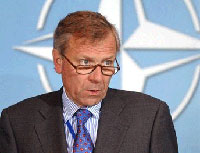NATO: Kosovo's peacekeeping mission should remain strong

NATO peacekeeping forces should be ready for handling violence in Kosovo, as province’s leaders seem to fight for their independence after a failure of negotiations.
"We will act resolutely against anyone who seeks to resort to violence," said alliance Secretary-General Jaap de Hoop Scheffer as he opened the meeting of the 26 NATO nations.
The meeting sent a veiled message to Kosovo's ethnic-Albanian majority not to make a sudden declaration of independence after an expected acknowledgment by mediators from Russia, Europe and the United States that efforts to find a negotiated settlement have reached a dead end.
Instead of declaring unilateral independence, NATO spokesman James Appathurai urged a "managed and controlled" transition to decide the final status of the breakaway province.
The United States and leading European allies are hoping to revive a plan - rejected by Serbia and its Russian backers - for a gradual, supervised move to statehood. Others - notably Spain, Romania, Slovakia and Greece - are more cautious, fearing that Kosovo independence with agreement from Serbia could encourage separatist movements in other regions.
Despite the lack of agreement on Kosovo's final status, the allies agreed that NATO's 16,450 peacekeeping troops could continue their mission under the current U.N. mandate.
A battalion of German troops has already been sent to Kosovo to strengthen the force, and British, Italian and French units are being held in reserve, ready to move in if there is a new flare-up of violence.
Talks to establish a united Western position on Kosovo's future are expected to continue in the margins of an European Union-Africa summit in Lisbon this weekend and at the bloc's regular year-end summit next week.
British Foreign Secretary David Miliband said it was essential that Western countries avoid the divisions that prevented them from taking decisive action to halt Balkan bloodshed in the 1990s.
"I believe that we can achieve a strong degree of unity on the question of Kosovo," he told reporters on arrival at NATO headquarters.
Kosovo has been run by the United Nations, backed by NATO troops, since 1999 when a bombing campaign by allied warplanes ended a Serb crackdown on the separatists.
The Kosovo question has led to sharp divisions between the West and Russia, whose Foreign Minister Sergey Lavrov this week accused Western nations of hampering efforts to find a negotiated solution by backing Kosovo independence.
Four months of more talks have failed to find a solution, prompting the Kosovo Albanians to say they will declare independence - possibly early in 2008.
The U.S. and leading allies would prefer application of the supervised statehood plan, even without a U.N. agreement. Several want any decision on Kosovo's status delayed until after Serbia's presidential elections, tentatively scheduled for Jan. 20.
Lavrov, who was to join his NATO counterparts later Friday, accused Western powers of encouraging Kosovo separatists and has urged more international talk. However, U.S. Secretary of State Condoleezza Rice on Thursday said the international negotiating team appeared to have "exhausted" its opportunities.
The dispute over Kosovo is one of a series of disagreements that have seen NATO-Russia relations decline sharply over the past year. Moscow plans to suspend application of a key Cold War-era arms agreement on Dec. 12, partly in response to U.S. plans to install anti-missile defenses in Poland and the Czech Republic.
Subscribe to Pravda.Ru Telegram channel, Facebook, RSS!


